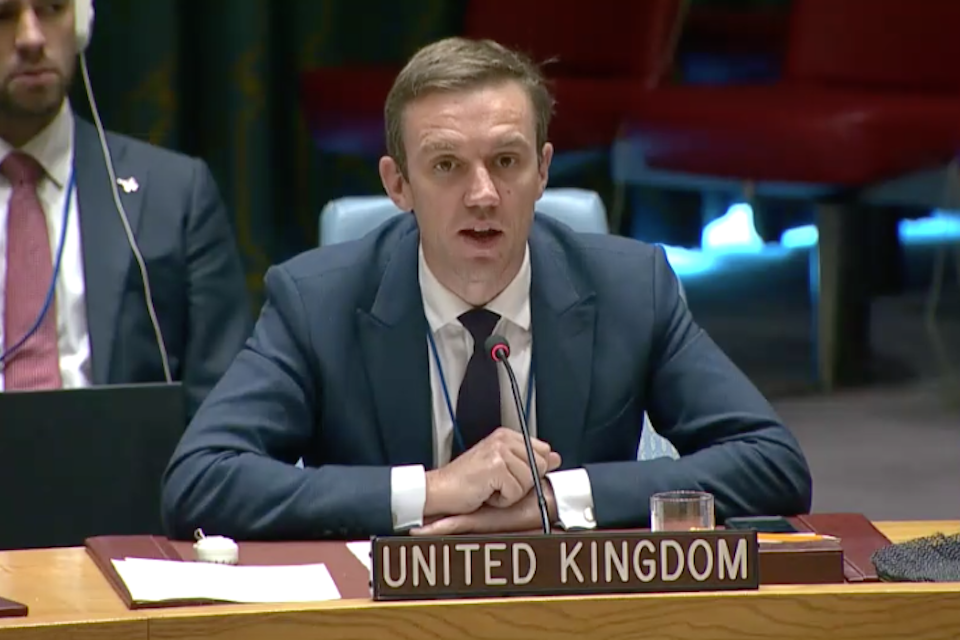
Mr President, let me start by thanking Assistant Secretary-General Keita and Ambassador Vieira for their briefings today, which set out a broadly optimistic assessment of Guinea Bissau's political trajectory.
The United Kingdom shares this cautious optimism. The successful conduct of legislative elections in March and the subsequent appointment of a prime minister and formation of a government are significant steps forward, and we commend the Bissau Guinean authorities - and people - on this progress. Turnout of 85% in the legislative elections was an impressive signal of the commitment of the people of Guinea Bissau to a democratic future for their country.
The next step in Guinea Bissau's political transition is the presidential election in November. We hope to see the country build on the positive momentum generated by the legislative elections earlier this year. The United Kingdom notes the challenges set out by ASG Keita today, and calls upon all Bissau Guinean political stakeholders to put the national interest first and play their part in delivering a free, fair, timely, inclusive and credible election.
Like other Council members, we were encouraged to see the enactment of the new gender parity law in government, requiring a minimum representation of women in elections of 36%. We urge Bissau Guinean political parties to adhere to this law; a more diverse government will be a stronger and more stable government. We also commend Prime Minister Gomes for splitting his cabinet posts equally between men and women, and we would be encouraged to see this law transferred to other national institutions in Guinea Bissau.
We note in the Secretary-General's report the commendable behaviour of the Guinea Bissau military in the years following the 2012 coup. Should the presidential elections take place as scheduled in November in a free and fair manner, and pending implementation of the priority reforms as outlined in the Conakry Agreement and the ECOWAS Roadmap, the United Kingdom would be open to a review of the sanctions measures currently imposed under Resolution 2048.
Mr President, the United Kingdom appreciates the supporting role played in Guinea Bissau by UNIOGBIS, the Peacebuilding Commission, the UN Country Team and other UN bodies and offices, which have helped build a more robust and inclusive political environment. We welcome the appointment of the new Special Representative of the Secretary-General, Ms Sori-Coulibaly and offer her our full support in carrying out her mandate.
The United Kingdom also recognises the key role played by ECOWAS in holding political stakeholders in Guinea Bissau to account. We trust ECOWAS will remain as engaged and vigilant as Guinea Bissau prepares to hold its presidential elections in November and throughout the full implementation of the Conakry Agreement.
We also welcome the steps taken so far by UNIOGBIS in preparation for transition, and note that these steps are a positive reflection of the political progress made in Guinea Bissau. The United Kingdom continues to believe that December 2020 is a realistic deadline for UNIOGBIS's withdrawal from Guinea Bissau. However, we would be ready to review this position should there arise a serious threat to peace and stability. It is our sincere hope, however, that such a threat does not arise, and that the shared sense of optimism we've heard today continues to be well justified.
As UNIOGBIS prepares to withdraw from Guinea Bissau and hands over key responsibilities to the UN Country Team and UNOWAS, it is imperative that political stakeholders continue to engage positively with UN good offices and sustain their commitment to the Conakry Agreement until it has been fully implemented. In that context, we welcome UNOWAS efforts to increase their engagement on Guinea Bissau ahead of the departure of UNIOGBIS.
We hope that the political progress that Guinea Bissau has achieved in recent years can be maintained to carry the country out of its past and into a stronger, more stable, more democratic future. The primary responsibility for delivering this lies with the Bissau Guinean government. The United Kingdom, along with the international community, will continue to monitor the situation closely and work with the government in support of this objective.
Thank you, Mr President.






